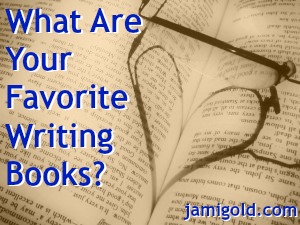I spent a couple of hours yesterday playing with a plugin my Tech Guy installed on my site. (If you’re hosted with TechSurgeons as well, you might be able to get it on your site too if you ask Jay, our very own tech genius.)
The plugin is called MyBookTable and allows me to list books in different categories and offer buy links. Useful plugin for authors, right? *smile*
In my For Writers section, I created a page to list my favorite writing craft and reference books. I’ve added several books that I thought of off the top of my head, but I know I’m forgetting a bunch too.
When we start down the writing path, we have a lot to learn. We might have to learn story structure or the basics of grammar. Many an author has had to learn about point of view options or techniques for showing instead of telling.
And that’s just covering some of the basics of writing craft issues. We might also want to study query writing, how to self-edit, or how to self-publish—and there are books to cover all those topics and more.
So let me share the books I thought of yesterday (and more importantly, let me share why they were useful enough to be top of mind), and let’s see what others have to add as suggestions. *smile*
The Emotion Thesaurus: A Writer’s Guide to Character Expression
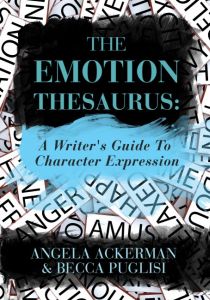 This book has been my #1 Go-To Writing Help book ever since it released. With 2 full pages of ideas about how to show character emotions for each of the 75 different entries, we can learn endless options for the physical signs, internal thoughts, and internal sensations (visceral reactions) for every emotion, whether the character is the point-of-view character or not.
This book has been my #1 Go-To Writing Help book ever since it released. With 2 full pages of ideas about how to show character emotions for each of the 75 different entries, we can learn endless options for the physical signs, internal thoughts, and internal sensations (visceral reactions) for every emotion, whether the character is the point-of-view character or not.
I could go on for pages and gush about the awesomeness of this book. *grin* Instead I’ll just point you to my post about how we can use this resource to improve our writing.
The Positive Trait Thesaurus: A Writer’s Guide to Character Attributes and The Negative Trait Thesaurus: A Writer’s Guide to Character Flaws
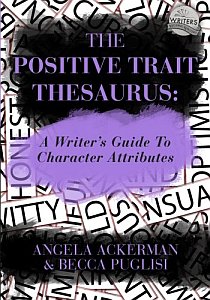
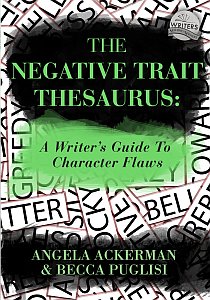 Finding the perfect mix of strengths and weaknesses for our characters can be difficult. We need to choose the right blend of strengths that make them admirable and worth rooting for—without making it too easy for them to succeed—and we need to figure out which flaws best fit our characters.
Finding the perfect mix of strengths and weaknesses for our characters can be difficult. We need to choose the right blend of strengths that make them admirable and worth rooting for—without making it too easy for them to succeed—and we need to figure out which flaws best fit our characters.
These books, cousins to the Emotion Thesaurus above, are great tools for creating three-dimensional characters. Check out the guest post by Becca (one of the co-authors) for more about how these books can be used in our writing.
Self-Editing for Fiction Writers, Second Edition: How to Edit Yourself into Print
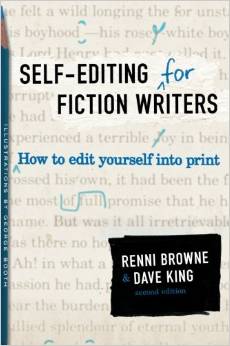 In this book, two editors step us through the process of editing our own work. They cover most of the major issues all writers—and newer writers especially—tend to struggle with in the pursuit of better writing.
In this book, two editors step us through the process of editing our own work. They cover most of the major issues all writers—and newer writers especially—tend to struggle with in the pursuit of better writing.
No matter how we plan to publish, we should strive for a cleaner manuscript. If we’re taking the traditional publishing path, quality writing craft makes it more likely an agent will request our pages. If we plan to self-publish, I wouldn’t recommend relying only on our own editing abilities and skipping an outside edit, but improving our prose the best we can on our own ensures that a freelance editor will be able to focus on the issues we can’t fix ourselves.
The Power Of Point Of View: Make Your Story Come To Life
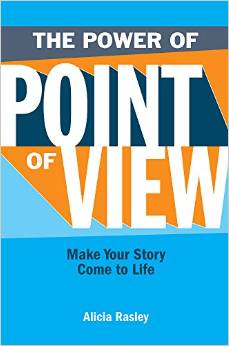 Many writers struggle to understand the differences between distant and close third person point of view, or when first person might work better than a close third (or vice versa). This book will make us a POV expert. Learn about the different styles of point of view, from omniscient third person to close first person—and everything in between.
Many writers struggle to understand the differences between distant and close third person point of view, or when first person might work better than a close third (or vice versa). This book will make us a POV expert. Learn about the different styles of point of view, from omniscient third person to close first person—and everything in between.
This book is perfect for those of us unsure about the differences between point-of-view styles or those who wonder which style is right for our story. Most of what I learned about POV started with this book.
Story Engineering: Master the 6 Core Competencies of Successful Writing
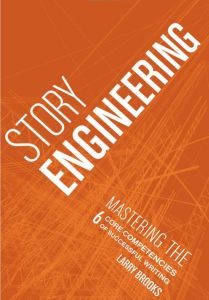 Yes, this book has a strong anti-pantser (writing by the seat of our pants) bias, and I’ve pointed out before that story failures are more often a symptom of not understanding story structure than with pantsing methodologies. Pantsing and plotting strategies can both fail or succeed, and in either case, those who understand story structure will be more likely to come out with a coherent story.
Yes, this book has a strong anti-pantser (writing by the seat of our pants) bias, and I’ve pointed out before that story failures are more often a symptom of not understanding story structure than with pantsing methodologies. Pantsing and plotting strategies can both fail or succeed, and in either case, those who understand story structure will be more likely to come out with a coherent story.
Pantsers able to ignore that naysaying, or those who plot in advance, will find a great discussion of story structure within these pages. Don’t miss my post or worksheet to help writers of any length stories use this structure.
Save The Cat! The Last Book on Screenwriting You’ll Ever Need
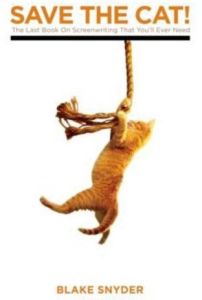 This book isn’t my favorite for learning story structure (and it’s geared toward screenwriters rather than novelists), but it is a classic that literally “wrote the book” on many story structure ideas and strategies (like the concept of beats and beat sheets).
This book isn’t my favorite for learning story structure (and it’s geared toward screenwriters rather than novelists), but it is a classic that literally “wrote the book” on many story structure ideas and strategies (like the concept of beats and beat sheets).
It reveals audience (or in our case, reader) reasons for why stories are structured the way they are, and that’s good for every writer to understand. Don’t miss my post about how writers of any length stories can use this structure.
Hooked: Write Fiction That Grabs Readers at Page One & Never Lets Them Go
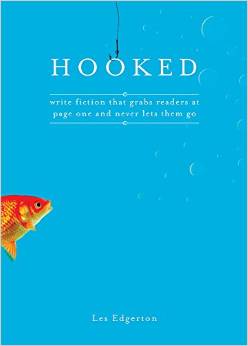 We’ve discussed the importance of story openings many times here before, from how to avoid first-page clichés to what makes readers close a book. Grabbing readers’ attention is an important skill because if our story has a bad beginning, no one will keep reading. Period. The end.
We’ve discussed the importance of story openings many times here before, from how to avoid first-page clichés to what makes readers close a book. Grabbing readers’ attention is an important skill because if our story has a bad beginning, no one will keep reading. Period. The end.
Whether we traditionally publish or self-publish, a great beginning is a necessity. This book covers the elements inherent to any great beginning and can help us overcome weak openings.
That’s a start for a few books that I’ve read and appreciated, but I’m missing loads, I’m sure. I don’t have any grammar books up there. Or any publishing industry or self-publishing books. Etc., etc. So I suspect this page of recommendations will be a work in progress. *smile*
What are your favorite writing-related books? What makes them your favorites? What books have helped you the most in your writing journey? How have they helped? Is there an area that you still struggle with and want recommendations for books in that specialty?

